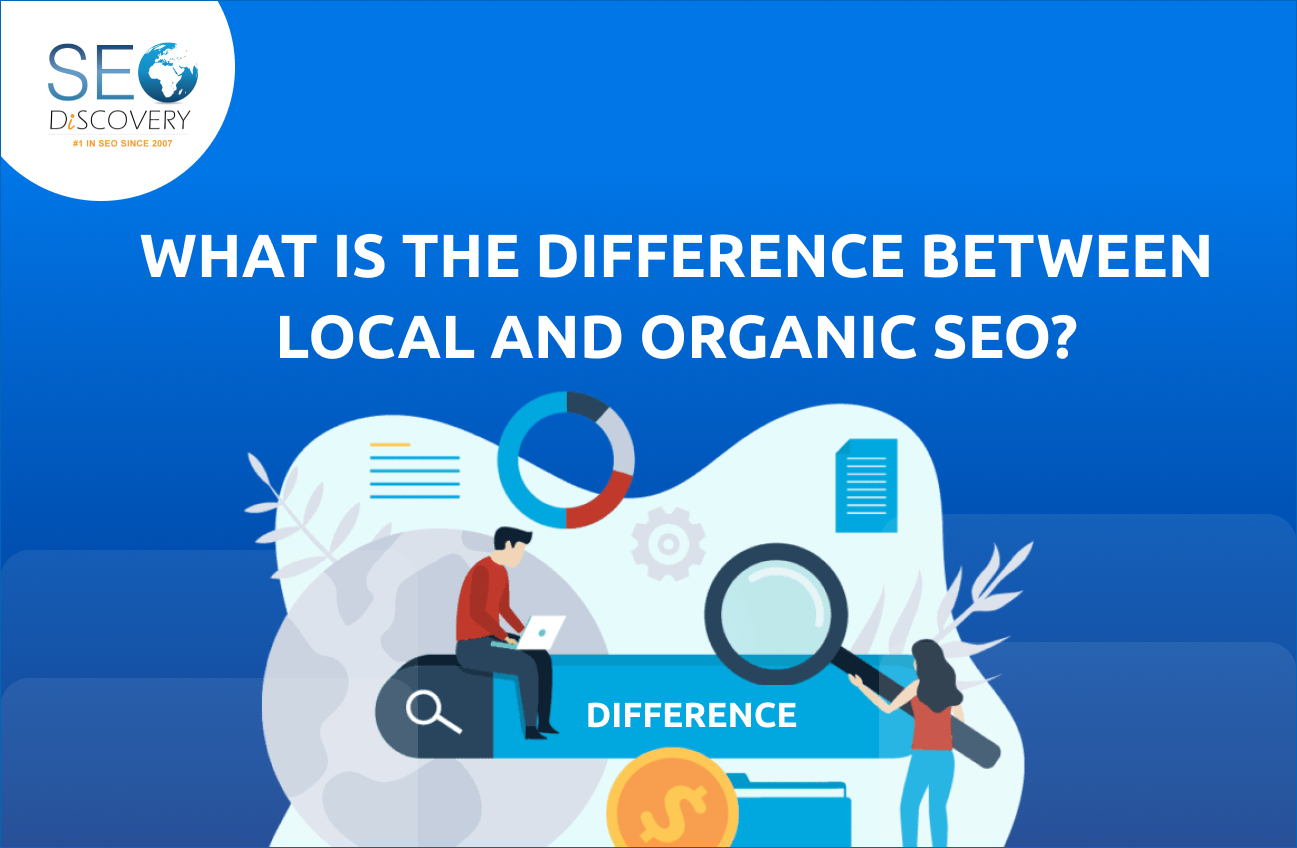Are you looking to attract new business prospects? If yes, then a solid SEO strategy is the best way to navigate the market. All you need to do is pick specific tactics that give your business a boost on a long-term basis. Here’s what you need to do. Choosing local SEO or organic SEO are two routes you can follow to achieve your goals.
“Websites ranking organically on the first page of Google get 10x more clicks than those relying on paid ads.“
So, Let’s dive into to get insights into both these strategies!
Table Of Contents
- Introduction
- Getting Familiar with Organic SEO
- Key Benefits Of Organic SEO
- On What Criteria Do Local And Organic SEO Differ?
- Conclusion
- FAQs
Getting Familiar with Organic SEO
Organic SEO is dependent primarily on a website’s overall presence in search results. The main focus is on optimising several aspects of a website to raise its position for pertinent keywords on search engine results pages (SERPs). SEO can only stand with a strong backbone, and that backbone is Organic SEO.
In contrast to paid advertising, organic SEO does not require paying search engines directly to rank highly in results. Instead, it depends on a systematic and comprehensive approach to improving a website’s user experience, relevancy, and credibility—factors that search engines recognise and commend with higher ranks.
Various Components Of Local SEO
- Content Is a King
Good, pertinent content is the foundation of organic search engine optimisation. Google, in particular, gives preference to content that fulfills user intent and offers valuable information. Developing practical, captivating, and well-written content can significantly increase a website’s exposure in organic search results.
- Optimisation Of Keywords
For any kind of search engine optimisation, it is essential to know what keywords your target audience uses. When these keywords are organically included in your content, meta data, headers, and even URLs, search engines can better determine how relevant your sites are to particular search queries.
- Developing Backlinks
Similar to digital endorsements, backlinks or inbound links from other reliable websites tell search engines that your material is trustworthy and valuable. Creating a varied and credible backlink profile is yet another essential component of organic SEO.
- Technical Search Engine Optimisation
For your website to succeed with organic SEO, it must be technically solid. This entails implementing appropriate URL structures, enhancing mobile friendliness, and speeding up websites. In addition to improving user experience, technical SEO facilitates search engines’ ability to index and crawl your content.
Key Benefits Of Organic SEO
With so many advantages for your company’s expansion, organic SEO is a vital tool for all businesses:
- Long-Term Visibility: Organic SEO makes sure your website appears higher in search engine results pages without requiring regular advertising expenditures.
- Build Credibility: Because they have earned their place through relevance, quality, and authority, websites that rank organically are seen as having greater credibility by users.
- Cost-Effectiveness: Since organic traffic doesn’t have a per-click fee, the long-term advantages outweigh the possible initial investment.
- User Experience: Increasing website usability, such as mobile responsiveness or page loading speed, through organic SEO frequently results in higher engagement.
Grasping The Fundamentals Of Local SEO
According to Backlinko, 76% of consumers who search for “near me” visit a business within a day. That means local SEO is intended to improve visibility inside a particular geographic area, whereas organic SEO aims to reach a broad national or even international audience. Actually, local search engine optimisation is only an organic SEO subset with a narrow focus on increasing visibility in local search results.
Retailers, restaurants, and service providers (both having brick-and-mortar shops and those operating within a specific service area) are among the businesses with physical locations for which local SEO methods are most relevant.
What are The Components Of Local SEO?
- Google Business Profiles (GBPs)
The most crucial aspect of local SEO to focus on is Google Business Profile, as Google now holds a market share of more than 80% for local searches.
Claiming and improving your GBP listing is the best approach to achieving one of these coveted spots in the local rankings, as Google Maps nearly always appears in the top results when users search for local companies.
- Regional References
Local citations are consistent online mentions of your company’s name, location, phone number (NAP) and other business information on a variety of platforms, including online directories and review sites. These mentions can help improve your local SEO.
Accurate and current information on the web establishes a business’s legitimacy and relevance in the local context, which Google and other search engines consider when determining their ranking algorithms.
- Content That Is Localised
For local SEO, you must adapt your material to regional trends, events, and interests. This entails producing blog entries, social media postings, and landing pages that are tailored to your local audience’s interests.
- Creating Local Links
Developing local backlinks from respectable local sources bolsters your company’s local authority. This could include working with neighbourhood companies or organisations, supporting events, or participating in neighbourhood projects.
- Local Evaluations and Ratings
Getting pleased clients to post good evaluations on review sites related to your industry, such as Yelp, Google Maps, Tripadvisor, and others, not only enhances your brand but also helps with local search engine optimisation.
Key Benefits Of Local SEO
Using local SEO to its full potential can change the game and take your company to new heights in your neighbourhood:
- Increased Local Visibility: Local SEO can greatly improve your online visibility in your local area, making it easier for prospective clients to find and interact with your company.
- Targeted Customer Reach: By making your website more visible for local search terms, you draw clients who are specifically looking to buy goods or services in your region, which raises the possibility of conversions and sales.
- Real Traffic Generation: Local SEO practically leads clients to your door with route planning tools like Google Maps integrations, encouraging foot traffic and bolstering your offline presence.
- More Conversion Rates: Compared to generic organic searches, local search inquiries are more likely to result in actual sales because they frequently reflect high buy intent, which maximises your return on investment (ROI).
- Build Trust and Credibility: Good ratings and reviews obtained by local SEO initiatives help to build trust and credibility with local customers, which in turn influences their purchasing decisions and cultivates enduring relationships.
On What Criteria Do Local And Organic SEO Differ?
What is the difference between local and organic SEO? Let’s take a look at some factors:
- Regional Emphasis
While local SEO focuses on increasing visibility within a particular geographic area, it is often relevant to businesses with physical locations or local service areas. Organic SEO seeks a worldwide or national audience without specific geographic limits.
- Keyword Range
While local SEO emphasises location-based keywords, such as city names, neighbourhood names, and other geographic identifiers, organic SEO concentrates on a broader range of keywords pertinent to the website’s overall theme.
- The business profile on Google
Although having a GMB listing helps with organic SEO, efforts should not be directed solely toward it. In contrast, GBP optimisation is given priority in local SEO as a basic element.
- Content Methodology
Writing for organic search engine optimisation involves addressing broad industry issues and trends, utilising broad, frequently short-tailed keywords, and tailoring the content to a wider audience.
Instead, local SEO produces material that speaks directly to local audiences. This includes localised keywords, which are typically longer-tail, along with details on events, news, and hobbies in the area.
Conclusion
For businesses looking to succeed in the cutthroat online market, understanding the intricate details of both organic and local SEO is key. While local SEO focuses on specific regional markets, organic SEO establishes the foundation for widespread visibility.
The variations in approaches, which range from backlink development and content production to keyword optimisation, show the need to customise SEO methods depending on business objectives. So, before employing one such strategy, it’s essential to understand what is the difference between local and organic SEO.
Frequently Ask Questions
Local SEO aims to make your business pop up in searches from people nearby, while Organic SEO is all about drawing in a wider audience without worrying about where they are. So, if you want to reach your neighbours, go local; if you want to cast a wider net, think organic.
Local SEO rankings are influenced by a bunch of things, like how accurate your business info is (think name, address, phone number), customer reviews, local keywords, and being listed in local directories. And don’t forget, optimising your Google My Business profile is key for being seen in local searches.
Yes, Google My Business (GMB) is essential for Local SEO. It helps your business show up in local search results and Google Maps. Claiming and optimising your GMB listing can improve your visibility and allow customers to find your contact information, reviews, and hours of operation easily.
Backlinks are vital for both types of SEO, but their impact varies. For Organic SEO, high-quality backlinks from authoritative sites can significantly boost your overall rankings. In Local SEO, local backlinks from community organisations, local news sites, or partnerships can enhance your visibility in local searches.


